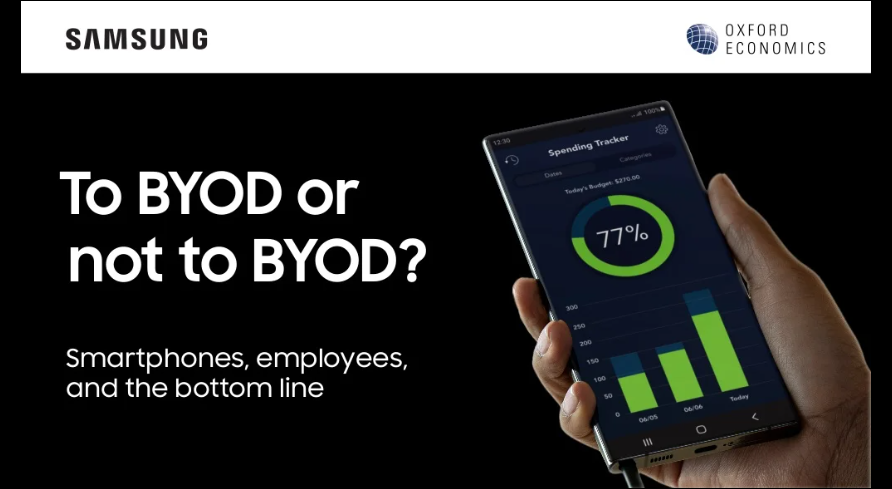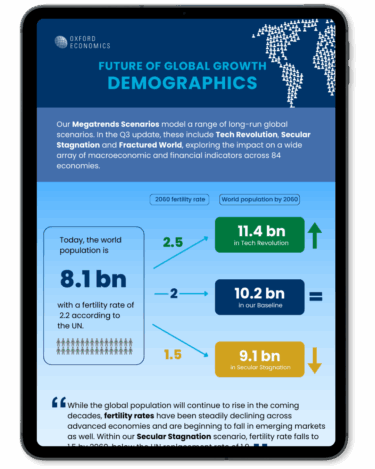Recent Release | 08 Jul 2022
Maximizing Mobile Value – To BYOD or not to BYOD?

Thought Leadership Team
Oxford Economics


Oxford Economics and Samsung collaborated to measure the contribution of smartphones in small and mid-sized businesses, and to determine whether BYOD or employer-provided devices is the right approach.
The research was fielded to 500 US executives and 1,000 employees from seven key industries: Retail, Healthcare, Transportation, High tech, Professional services, financial services and the Federal government.
Infographic

Smartphones and your employees: To BYOD or not to BYOD?
Calculator

Compare your enterprise mobility costs with the industry averages
About the team
Our Thought Leadership team produces original, evidence-based research made accessible to decision-makers and opinion leaders. Principals for this project included:

Edward Cone
Editorial Director, Thought Leadership

Edward Cone
Editorial Director, Thought Leadership
New York, United States
Editorial Director Edward Cone oversees global research programs for our Thought Leadership group. As Technology Practice Lead he works with clients such as Google, Accenture, IBM, SAP, and many others. His areas of focus include Artificial Intelligence, the impact of technology on business performance, and healthcare organizations.
Edward joined the firm in 2012 after more than two decades as a business and technology journalist based in New York, Paris, and North Carolina, including stints as an editor and writer at various Ziff Davis magazines (CIO Insight, Baseline), a contributing editor at Wired, and a staff writer at Forbes.
Edward also wrote a weekly newspaper opinion column for many years in his hometown of Greensboro, NC and authored a semi-popular blog. He has contributed to a bewildering variety of magazines and papers on topics ranging from politics to rock climbing and was a frequent speaker and organizer at new media conferences across the country. Honors for his work include the 2020 Rybczynski Prize, awarded for the best essay on economics by Society of Professional Economists, and various awards from the American Society of Business Publication Editors and the North Carolina Press Association. He has a BA from Haverford College.

Matthew Reynolds
Senior Research Manager, Thought Leadership

Matthew Reynolds
Senior Research Manager, Thought Leadership
New York, United States
Matt manages a broad spectrum of technology-centric Thought Leadership programs, from cloud and software innovation to how organizations can participate in the metaverse. He has led successful programs for dozens of large organizations during his tenure at Oxford Economics, including SAP, PwC, NTT Data, Accenture, IBM, and EY. Matt’s experience gives him deep knowledge of the ins and outs of successful end-to-end program management, and he is an integral part of the Thought Leadership team.
With the organization since 2015, Matt holds a Bachelor’s Degree in English from The College of New Jersey. He is scheduled to graduate with an MBA in IT and Analytics at the Rutgers School of Business in May, 2023.

Teri Robinson
Managing Editor, Thought Leadership

Teri Robinson
Managing Editor, Thought Leadership
New York, United States
Teri oversees all technology research programmes on the Oxford Economics Thought Leadership team. She is an award-winning cybersecurity and tech content specialist, journalist, and screenwriter who, for the better part of the last decade, led editorial for SC Media, a top-ranking cybersecurity news outlet. Her work has appeared in the New York Times, Inc. magazine and a wide variety of leading B2B titles. Her corporate clients have included Microsoft, Cisco, Iron Mountain, IBM, AT&T and American Express.
You might be interested in

Post
Future of Global Growth: Demographics
Our Megatrends Scenarios model a range of long-run global scenarios. In the Q3 update, these include Tech Revolution, Secular Stagnation and Fractured World, exploring the impact on a wide array of macroeconomic and financial indicators across 84 economies.
Find Out More
Post
Roadblocks to China’s chip self-sufficiency dream
China is unlikely to achieve full chip self-sufficiency any time soon because of high technological hurdles in producing advanced manufacturing equipment and materials. The self-sufficiency target now stretches well beyond actual fabrication to include the entire chip supply chain as China struggles to acquire necessary input and machinery into the production process.
Find Out More
Post
Why invest in AI ethics and governance?
In collaboration with the Notre Dame-IBM Technology Ethics Lab, Oxford Economics conducted 15 interviews with senior executives in 2024 to better understand how organizations are evaluating the ROI of AI ethics investments.
Find Out More
Post
Global P&C Insurance Outlook to 2050
Capgemini leveraged custom macro and insurance market forecasts from Oxford Economics for their latest P&C insurance flagship report.
Find Out More